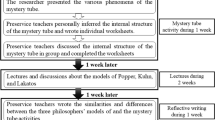Abstract
I report an action research study that aimed at improving Thai pre-service teachers’ understanding of the relationship between science and religion and at assisting them to respond to this issue in a science classroom. The participants were twelve post-grad students pursuing Master of Art in Teaching Science at Kasetsart University. They took a course, Philosophy of Science, taught by the researcher in Semester A, academic year 2007. Process drama is the teaching strategy employed. The students were fully engaged in the process drama; doing research, producing, distributing, and criticizing the drama. Focus group, student journal, and observation were used to gather the data and the data was analyzed using qualitative analysis techniques. The focus groups revealed that the drama could help students reflect on the complexity and sensitivity of the issue. They found there was no inherent conflict between science and religion since they answered different questions and used different methods to achieve their results. However, the conflicts occurred when people were not aware of the basic differences between the two so they justified one on the basis of purpose and method of one another. The pre-service teachers also found consistency between science and Buddhism. They thought that the teachers of science should respond to the conflicts in a respectful, compromising, and neutral manner.






Similar content being viewed by others
References
Barbour, I. G. (1997). Religion and science: Historical and contemporary issues. New York: HarperCollins.
Bentley, M. L. (2000). Improvisational drama and the nature of science. Journal of Science Teacher Education, 11, 63–75.
BouJaoude, S., Sowwan, S., & Abd-El-Khalick, F. (2009). The effect of using drama in science teaching on students’ conceptions of nature of science. Dordrecht, The Netherlands: Springer.
Bowell, P., & Heap, B. S. (2001). Planning process drama. London: David Fulton.
Kunjara, P., & Chatikavanij, P. (2007). Research animals for scientific purposes in Thailand: Ethics & policies. Proceeding at 6th World congress on alternatives & animal use in the life sciences, Tokyo, Japan.
Office of the National Education Commission. (2000). Statistics of religion in Thailand, 1999. Bangkok: Bangkok Block Partnership Ltd.
Payutto, B. P. (1991). Buddhism as the foundation of science. National Science Day Lecture, University of Chiang Mai, Northern Thailand.
Payutto, P. A. (1995). Toward sustainable science: A Buddhist look at trends in scientific development (trans: Bruce Evans), 2 rd. Bangkok: Buddhadhamma Foundation.
Polkinghorne, J. (1986). One world: The interaction of science & theology. Princeton, NJ: Princeton University Press.
Promta, S. (2004). Buddhism and human genetic research. The Chulalongkorn Journal of Buddhist Studies, 3(1), 342–354.
Webb, M. O. (2005). Science and religion: Models of coexistence. Reflections on the relationship between science and spirituality a Multidisciplinary Colloquium. Formby room of southwest collections building.
Author information
Authors and Affiliations
Corresponding author
Rights and permissions
About this article
Cite this article
Pongsophon, P. Using process drama to enhance pre-service teachers’ understanding of science and religion. Cult Stud of Sci Educ 5, 141–156 (2010). https://doi.org/10.1007/s11422-009-9215-4
Received:
Accepted:
Published:
Issue Date:
DOI: https://doi.org/10.1007/s11422-009-9215-4




